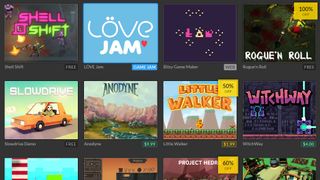Steam Direct is better than Greenlight, but the size of its fee will make or break it
The pros and cons of Steam Direct, and why the fee shouldn't be too high.

Steam Greenlight sucks as a way to decide what goes on Steam. It makes earnest developers pay to engage in a popularity contest that’s easily gamed, and so I’m happy that after years of Valve itself saying it isn’t working, Greenlight is finally going away. When Steam Direct appears later this year, every game will have a simple path onto the biggest PC game distribution platform—so long as the developer can put up a fee. Valve hasn’t settled on a number, but says it’s considering suggestions between $100 and $5,000.
If the fee lands at $5K we’ll end up with devs crowdfunding their submission fee, which would just be an outsourcing of Greenlight.
Instead of vetting every submission (Steam 1.0) or having the community vote (Steam 2.0), the barrier to entry becomes capital. What a tricky thing to balance. If the fee is too low, I’ll be throwing up a Flappy Bird clone as soon as possible, suckers. But if it’s too high, solo and small indie developers could be locked out. If it's $5K, for instance, we’ll end up with devs crowdfunding their submission fee, which would just be an outsourcing of Greenlight that also funnels money to Valve.
At least Valve says the fee will be “recoupable,” though it hasn’t decided exactly how. Valve employee Alden Kroll says in this Gamasutra comment that the fee will likely be returned to the developer “after the game hits some modest revenue target.” If that’s the case, Valve wouldn’t keep the fee, just its take of the revenue—that's nice, but developers would still have to deposit that money and potentially lose it if their game is unsuccessful. (Unless Valve plans to refund and delist failed games?)
The current Greenlight submission fee, which serves the same quality control purpose, is $100. It goes to charity and allows a developer to put up as many games as they want to be voted on by the community. So if you want a rough idea of what a $100 Steam Direct fee would look like, just imagine that every game on Greenlight is currently for sale on Steam. And why shouldn’t Poo Sky be on Steam?

Jim Sterling’s Greenlight-mocking video series paints an ugly picture of what to expect, but despite the worry that Steam will be flooded with the 30 scatalogical Flappy Bird clones I intend to submit this spring, I hope Valve errs low with the fee and focuses on making its discovery tools more robust. Promote the good stuff above the chaff, but don’t prevent good-intentioned developers from getting on the platform at all.
Greenlight really hasn’t turned Steam into the iOS App Store, anyway. There are some truly awful games lurking in the bowels of Steam’s discovery tools, but for the most part my experience with the store has been positive. It’s much more vibrant than it was five years ago, when it was only publisher-supported games and a few indie darlings.
Meanwhile, while Steam’s been fussing with Greenlight, new platform itch.io has risen up to serve us heaps of niche and experimental games—there is no fee or review process to get on the platform—many of which might have just been lost in the Greenlight churn. That community is great and it rules that they owned Steam on Twitter today, but I doubt the same thing would work well in the more profit-driven waters of Steam. It’s cool that itch.io creators will have a simpler way to bring their games to a new audience if they want to, though. (Unless they are our own James Davenport, who shouldn't put his game about teeth on Steam.)
Comic deals, prizes and latest news
Sign up to get the best content of the week, and great gaming deals, as picked by the editors.
Steam could do with an injection of experimental weirdness: Greenlight has made it more diverse, but it’s far from a catalog of everything that’s worth our attention. (Not that it ever will be, and competing stores are good, but more options for creators is good too.)

An argument against Steam Direct, or at least a low fee for it, is that more isn’t necessarily better. A common criticism of Steam, or just general anxiety about it, is that its rapidly growing library is burying good work that might have sold well on the platform five or more years ago. Steam Direct may exacerbate that issue, but I don’t support gating out developers who have less capital so that a smaller group of better-off developers have a greater shot at success. The question of how much an independent developer should expect to make from their game—and whether the huge number of competing indie projects is dooming good work to obscurity—is separate from the question of who deserves access to a popular platform.
I don’t support gating out developers who have less capital so that a smaller group of better-off developers have a greater shot at success.
Besides, we need to lose this false idea that Steam is where all buying decisions are born. As Evan wrote in 2015, "Millions of people now operate massive engines that promote discovery: YouTube, Twitter, Reddit, Twitch, websites like ours—all resources that didn’t exist in anywhere near the same form even three or four years ago."
I use Steam a lot. My friends use it, so I can easily play games with them, it's convenient, and it works well. All I really want is for there to be lots of good games on it, and a lower fee helps ensure that good games aren't left out.
That's not to say I'll be happy if the same policy attracts more cynical, exploitative crap. In my ideal world, honest creators who make a real effort are rewarded with visibility while the 135 scatalogical, pro-fracking Flappy Bird clones I’m definitely putting on Steam this year are rejected and someone eggs my house. But since Valve refuses to be the arbiter of what goes on Steam, only one of those things can be true.
I think Valve should do a little more active quality control, but if laissez faire is how it’s going to be, I prefer Steam Direct’s ‘pay a fee, get on Steam’ plan to Steam Greenlight’s ‘pay a fee, maybe get on Steam’ plan—at least so long as the fee doesn’t lock out small developers who may be working with no budget in their spare time.

Tyler grew up in Silicon Valley during the '80s and '90s, playing games like Zork and Arkanoid on early PCs. He was later captivated by Myst, SimCity, Civilization, Command & Conquer, all the shooters they call "boomer shooters" now, and PS1 classic Bushido Blade (that's right: he had Bleem!). Tyler joined PC Gamer in 2011, and today he's focused on the site's news coverage. His hobbies include amateur boxing and adding to his 1,200-plus hours in Rocket League.
Most Popular




